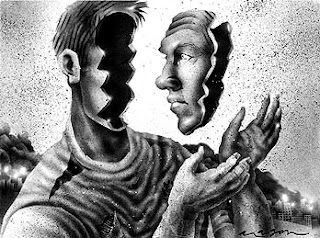The view of the world comes to us warped through a prism. The prism is our mind, built from past experiences and of our long and short-term paradigms.
That is how the mind sees the outside, but how does it see itself? In my opinion, the prism through which we view ourselves is significantly more skewing than the already misleading one with which we see the outside environment. The main reason is that the view of ourselves is not based on who we actually are – but on whom we learned that we are.
To what degree does the difference between who we are and our perception of self vary from person to person?
At first, I thought that to a large degree since the discrepancy is affected a lot by the level of importance we assign to the opinions of others and to how many of others we listen. This is very different from person to person. Then, however, I took a more controversial consideration as my final answer to myself. This degree has very small variance. That is because our perception of self is so much affected but what we learned that we are, that the actual correlation b/w our opinions and reality is probably 20 – 30%, if not less. If almost everyone hypothetically fit within that range, then the variance is small – we are all largely mistaken in how we view our own selves.
A different thought is that our view of ourselves alters ourselves to be more compliant with what we think. If we think that we are confident in ourselves then we become such. If we think we are pretty, then others learn to perceive us in that way too. This self-fulfilling prophecy factor is not considered by me when thinking about these questions.
The second question I thought of – how to we make the view of ourselves more accurate?
 My personal answer is that we don’t need to. Since ourselves aligns with what we think of ourselves and so does the opinion of others then why do we need to see the truth? Truth hurts.
My personal answer is that we don’t need to. Since ourselves aligns with what we think of ourselves and so does the opinion of others then why do we need to see the truth? Truth hurts.
Finally, if what we see is so much affected by ourselves and we are effectively put in the “centre of the Universe” sort of speak, then how do we prevent self-absorption?
This is a concern I had to face in a number of transitional stages of my personality and its growth. My own reaction to when I have noticed that I would become too self-absorbed would be to forcefully “bring myself down to the ground.” That would usually encompass a significant loss in self-confidence at the given period of time. I do realize that this is not the way. Now, when in danger of becoming too self-absorbed I just switch my attention to my friends. I begin thinking of them and how they are also individuals, all of them better than me in one thing or another. This reminds me that everyone is superior to me in something just as I am superior to everyone in something as well. That puts me on the same level as people around me.
 To conclude, our self-perception is very rarely reflective of reality. Reality does gravitate towards self-perception though. Self-perception and perception of us that others have mutually gravitate to a common point. Because of this, we do not need to make our self-vision more accurate. And self-absorption can be prevented at will by simply thinking of others.
To conclude, our self-perception is very rarely reflective of reality. Reality does gravitate towards self-perception though. Self-perception and perception of us that others have mutually gravitate to a common point. Because of this, we do not need to make our self-vision more accurate. And self-absorption can be prevented at will by simply thinking of others.
I have also discovered that I already wrote about this in Facebook Notes. The post was called “Paradox” and I posted it in the previous week as a reference to this one for you to see J




